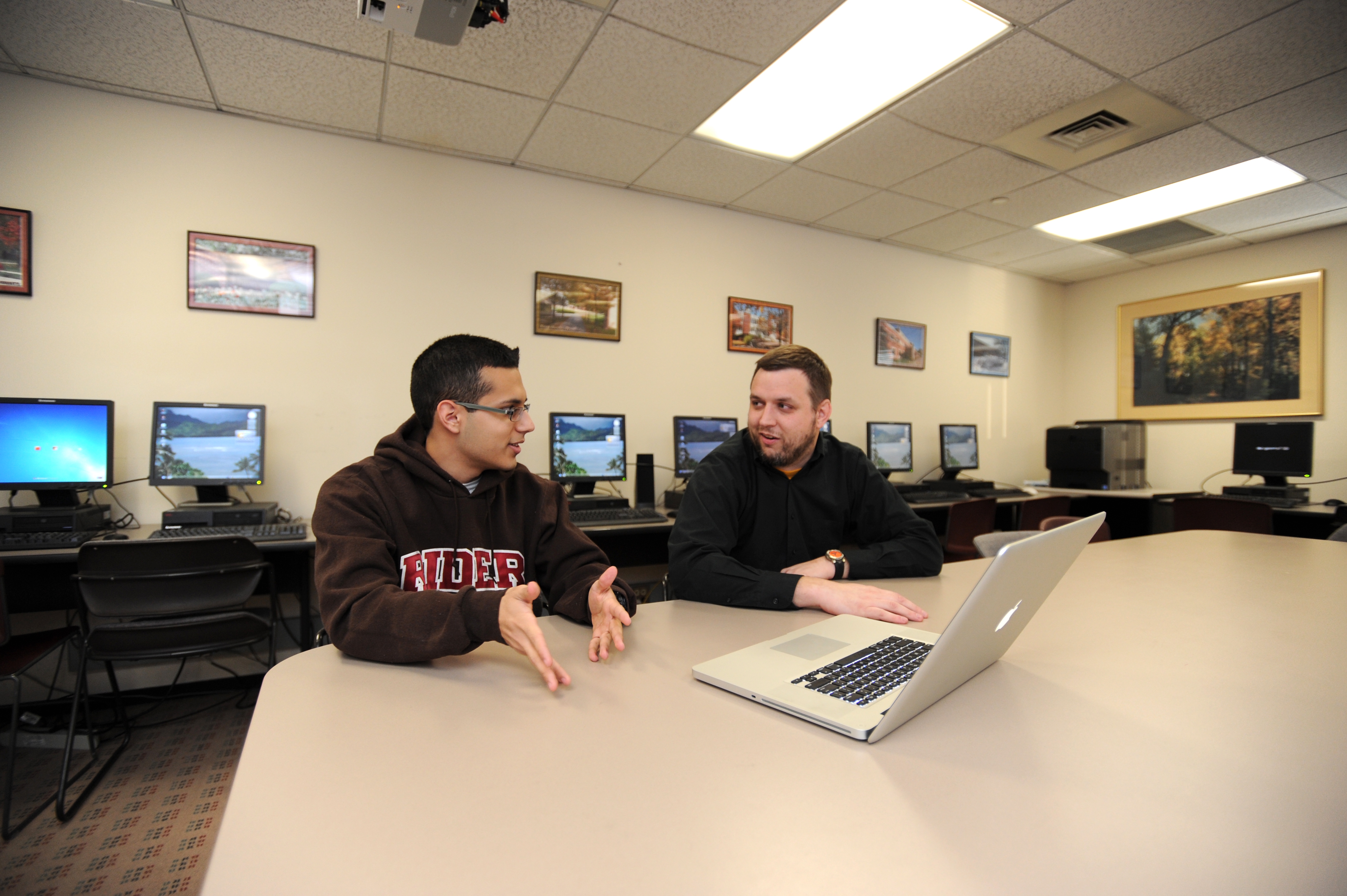Wednesday, Mar 27, 2013
Three Rider graduates now working in various fields of technology joined forces to train Henry Rodriguez ’13 for a berth in the March 23 finals of the cybersecurity competition.
by Lauren Adams
An inspired partnership between a talented Rider senior and a group of like-minded alumni helped propel Henry Rodriguez ’13, a Computer Information Systems major, to the state finals of the New Jersey Governor’s Cyber Corps Challenge on March 23 at Brookdale Community College in Lincroft.
The Cyber Corps Challenge is an online competition consisting of three modules covering networking, operating systems and system administration. Finalists were chosen from a pool of more than 600 students statewide to attend the all-day, real-time competition of security exercises.
Rodriguez, who finished the event ranked in the 40s, was satisfied with the results, especially since he had no formal training in the cybersecurity prior to the competition.
“At first, I thought I didn’t do so well because I wasn’t in the top 10 or 20 but after thinking about it, I am happy,” said Rodriguez, a resident of Jersey City, N.J. “I didn’t have any hands-on experience coming into the competition and even being selected out of the 600-plus people to come to the live event was an honor in itself.”
Rodriguez received an assist from a team of Rider alumni “coaches” who work in various fields of technology. Nick Santora ’08, M.B.A. ’11, a critical infrastructure protection cybersecurity specialist at North American Electric Reliability Corporation; Chris Holcombe ’05, a storage engineer at Facebook; and Sean R. Piotrowski ’04, M.B.A.’07, technical support specialist at Princeton University and adjunct lecturer for the Computer Information Systems at Rider, helped Rodriguez hone his cyber-skills. Arthur Taylor, associate professor of Computer Information Systems, also provided access to study materials and assisted Rodriguez with his preparation.
As a pilot program, the highly competitive event demands that all participants sharpen their cybersecurity skills through intensive preparation. Recognizing an exceptional opportunity for students interested in career opportunities in cybersecurity, Dr. William Amadio, professor of Computer Information Systems, identified a group of promising students and gathered the team of alumni and faculty to serve as coaches.
The challenge for the team of mentors was to develop training for the pilot program.
“We took our knowledge in the three modules and created a ‘brain trust’ to develop a program for the students to follow,” Piotrowski explained. “Both Chris Holcombe and Art Taylor have taught networking classes at Rider. Add to that Nick Santora’s extensive cybersecurity experience and I believe we were able to create a focused learning module to help the students prepare.”
Piotrowski, who taught Rodriguez in a class, recommended he join the student group based on both his academic promise in CIS coursework and his intrinsic interest in the Linux operating system.
“Even with the high level of difficulty, I felt Henry had the ability to advance,” he said.
In fact, Rodriquez’s skill-set turned out to be an ideal fit and helped advance him to the finals.
“My Linux experience is where I excelled in the first phase of the Cyber Corps Challenge,” Rodriguez said. “Since I had Professor Taylor for quite a few classes, I talked to him about Linux in depth during my preparation.”
Rodriguez also said that Santora’s knowledge of BackTrack, a Linux-based penetration testing toolkit, was a key advantage, and a primary reason for his success in Phase I of the competition. BackTrack provides security professionals the tools needed to perform vulnerability assessments and penetration testing in an environment dedicated to hacking information systems.
“All of our students competing in the Cyber Corps Challenge are getting a firsthand look at how complex and important cyber security is becoming,” Piotrowski said. “The knowledge they gain from participating in this event will better prepare them for their entry into the job market. All 12 of our students should be commended for their dedication since the material was, at times very difficult to master.”
Holcombe, who recently began working at social media leader Facebook, said students had to adapt quickly to the new knowledge they received.
“Many times at companies, this is exactly how fast things go to get ramped up on new technologies,” he explained. “I hope this becomes an ongoing activity where mentors and students work together to build new skills.”
Finalists in the Cyber Corps Challenge worked in NetWars, the system used by the U.S. Armed Forces, as well as various businesses and federal government agencies, to identify elite cyber skills.
“I’m glad I did it though because I learned so much new information that day. I also realized that I have a skill for absorbing new information,” Rodriguez said afterward. “Hopefully my actions at the competition inspire other students in the CIS department to want to compete in these types of tournaments are truly test their skills.”
Santora is pleased by the work done by Rodriguez, as well as his peers at Rider, particularly because the depth of questions in Phase I involved a knowledge deeper than that of the typical college student.
“I’m extremely proud that Henry advanced,” he said. “The fact that Rider had a student advancing to the finals is a testament to his talent and dedication.”

